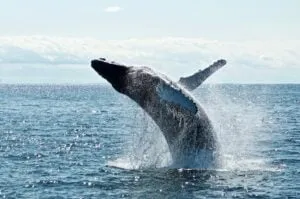Have you ever dreamed of witnessing the gentle giants of the ocean with your own eyes? The good news is, you don’t have to travel far to make that dream a reality! New Jersey, the beautiful coastal state of the United States, is a fantastic destination to experience exhilarating whale watching tours. Just a short distance from New Jersey’s vibrant coastline, you’ll have the opportunity to admire various whale species in their natural habitat.
Guided by experienced professionals, whale watching tours in New Jersey will bring you closer to these magnificent marine creatures. Join “Du lịch khắp thế gian” (Travel the World) to explore everything about the unique whale watching experience in New Jersey, from the types of whales you might encounter and the best time to take a tour, to helpful tips for a perfect trip.
1. What Types of Whales Can You See in New Jersey?
The waters off the coast of New Jersey are home to and a migration route for many different whale species. Among them, the most common is the humpback whale, famous for its spectacular displays on the water’s surface. You might also encounter the fin whale, the second-largest animal on the planet, or the minke whale, small but equally graceful.
Occasionally, this area also welcomes rare visitors like the critically endangered North Atlantic right whale. In addition, pilot whales, blue whales, sperm whales, and sei whales have also been recorded in the vicinity, offering exciting surprises for lucky tourists.

2. When is the Best Time for Whale Watching Tours in New Jersey?
The peak whale watching season in New Jersey typically runs from May to October, when whale populations migrate to the warmer waters of the North Atlantic to feed and breed. During this time, your chances of seeing whales are highest. However, you may still have opportunities to spot whales in April and November, although in smaller numbers.
For the best experience, you should choose the mid-summer period, when the weather is warmer and the sea is calmer. This not only allows you to comfortably enjoy the trip but also increases the likelihood of spotting whales, as they are often more active in favorable weather conditions.
3. Where are the Best Places to Go Whale Watching in New Jersey?
New Jersey boasts a long and diverse coastline, with many excellent locations for whale watching tours to depart. Some popular harbors where you can find tours include:
- Cape May: Located at the southern tip of New Jersey, Cape May is a popular destination for whale and dolphin watching tours. Its convenient geographical location makes it an ideal stopover for migrating marine life.
- Wildwood: Also in the southern region, Wildwood offers many whale watching tour options, suitable for families and groups.
- Atlantic City: This vibrant city is not only famous for casinos and entertainment but also a departure point for many exciting whale watching tours.
- Point Pleasant Beach: Situated in the central coast region of New Jersey, Point Pleasant Beach is a convenient option for those who want to combine whale watching with other beach activities.
Tours typically take you to New York Bay or nearby areas off the Atlantic coast, where whales and other marine life congregate.

4. What is the Best Time of Day for Whale Watching?
Whales are active both day and night, so there is no specific time considered “best” for watching them. However, many people prefer morning or late afternoon tours because the soft light at these times can create better photo opportunities.
Tour companies usually run trips at various times throughout the day, allowing you to flexibly choose a schedule that suits you. No matter what time you choose, rest assured that the experts will always do their best to take you to areas with the highest probability of whale sightings.
5. How Long Do Whale Watching Tours in New Jersey Last?
The duration of whale watching tours in New Jersey typically ranges from 2 to 4 hours, depending on the tour operator and the type of tour you choose. Shorter tours usually focus on finding whales in nearshore areas, while longer tours may venture further offshore to increase the chance of encountering a variety of marine life.
Most tours use high-speed boats or catamarans to quickly reach whale watching areas, saving you travel time and giving you more time to observe and admire the magnificent whales.
6. What Should You Wear on a Whale Watching Tour?
Weather at sea can change quite quickly, especially when you travel far from shore. Therefore, prepare appropriate clothing to ensure comfort throughout the trip. Here are some suggestions:
- Comfortable clothing: Choose loose-fitting, breathable clothing suitable for the weather. In summer, T-shirts, shorts, or light pants are good choices.
- Jacket: Even in summer, temperatures at sea can still be chilly, especially when the boat is moving fast. A light jacket or windbreaker will help keep you warm and prevent colds.
- Comfortable shoes: Choose sneakers, walking shoes, or sandals with straps for easy movement on the boat. Avoid high heels or flip-flops as they can be inconvenient and dangerous on board.
- Sunglasses and hat: Sunlight at sea is very strong, so sunglasses and a hat will help protect your eyes and face from harmful UV rays.
- Sunscreen: Don’t forget to apply high SPF sunscreen before boarding, even on cloudy days.
Many whale watching boats in New Jersey are equipped with covered cabins and comfortable seating, allowing you to rest and escape the sun when needed. However, to fully enjoy the whale watching experience, you should still spend time standing on the deck to observe and take photos.
7. What Other Essentials Should You Bring?
In addition to appropriate clothing, you should also prepare some other essentials to make your whale watching trip more complete:
- Camera or phone: Of course, you’ll want to capture memorable moments when you see whales breaching or swimming playfully. Make sure your device has enough battery and storage.
- Binoculars: Although the boat will try to get as close to the whales as possible, binoculars are still a useful tool for observing them more clearly, especially when they are far away or only briefly surface.
- Water and snacks: Most tours sell drinks and snacks on board, but you can also prepare your own to save money or bring your favorite items.
- Motion sickness medication (if needed): If you are prone to motion sickness, take motion sickness medication about 30 minutes before boarding as a precaution.

8. How to Deal with Seasickness?
Seasickness is a fairly common problem when going to sea, especially on rough days. To minimize the risk of seasickness and discomfort, you can take some of the following measures:
- Take motion sickness medication: This is the most effective way to prevent seasickness. You can buy over-the-counter medication at pharmacies and take it as directed before boarding.
- Choose an appropriate seating position: If possible, choose a seat in the middle of the boat or near the upper deck, where there is less rocking. Avoid sitting at the stern or lower deck, where the rocking sensation is strongest.
- Look at the horizon: Focusing on the horizon or a fixed point in the distance can help stabilize your vestibular system and reduce dizziness.
- Eat light before going: You should not be too hungry or too full before boarding. A light, easily digestible meal will be better for you.
- Drink enough water: Dehydration can increase the risk of seasickness. Drink enough water before and during the trip.
- Avoid reading or looking down: Focusing on activities like reading or looking down can worsen seasickness.
If you feel seasick, inform the crew on board. They may be able to provide you with some support measures or take you to a more ventilated area.
9. What Other Marine Life Can You See Besides Whales?
Whale watching tours in New Jersey are not only an opportunity to admire giant whales but also a chance to explore the diversity of the local marine ecosystem. On your journey, you may encounter many other interesting marine creatures, including:
- Dolphins: Bottlenose dolphins and Atlantic white-sided dolphins are common species in New Jersey waters. They are known for their intelligence, friendliness, and playful acrobatics on the water’s surface.
- Seals: Harbor seals and gray seals sometimes appear near the New Jersey coast, especially in winter and spring. You may see them basking on rocks or swimming and foraging near the boat.
- Seabirds: New Jersey waters are a habitat and feeding ground for many different seabird species, such as seagulls, terns, ospreys, and gannets. These birds often soar in the air or perch on the water, creating a lively and attractive scene.
- Sea turtles: Occasionally, you may also be lucky enough to see sea turtles swimming in New Jersey waters. Sea turtles are rare and protected animals, so cherish the opportunity to see them in the wild.
Even if you are not lucky enough to see whales on your trip (which is very rare, especially during peak season), observing other marine life and enjoying the fresh sea air is also a worthwhile experience.
10. Where to Find Whale Watching Tours in New Jersey?
You can easily find whale watching tours in New Jersey at harbors along the coast, especially in the locations mentioned such as Cape May, Wildwood, Atlantic City, and Point Pleasant Beach.
Many reputable tour companies offer quality whale watching tours, with experienced guides and modern equipment. You can find information and book tours online through travel websites or contact tour operators directly.
When choosing a tour, pay attention to factors such as price, duration, type of boat, and reviews from previous customers to ensure you choose a suitable and reliable tour.
11. Where to Learn More About Whales on Land?
To better prepare for your whale watching trip or simply to expand your knowledge of these amazing marine creatures, you can visit some marine education and conservation centers in New Jersey. Some suggestions include:
- Adventure Aquarium (Camden): Although not directly on the coast, this large aquarium has many exhibits on marine life, including whales and other marine mammals.
- New Jersey Sea Grant Consortium (Long Branch): This center provides education programs and exhibits about the local marine ecosystem, including information about whale species commonly found in New Jersey.
- Cape May MAC (Museums + Arts + Culture) Center: This center focuses on marine research and conservation, and also organizes public education programs about marine life, including whales.
Additionally, you can also read books, watch documentaries, or visit reputable websites about marine animals to learn more about whales and the vast ocean world.
12. How to Choose a Responsible Tour Operator?
When choosing a whale watching tour, prioritizing responsible tour operators is crucial. These companies are committed to adhering to conservation principles and protecting wildlife, ensuring that tourism activities do not negatively impact the habitat of whales and other marine life.
One sign of responsible tours is the Whale Sense certification. This certification is awarded to tour companies that comply with specific guidelines to protect and respect whales, such as maintaining a safe distance from whales, not making loud noises to disturb them, and not littering at sea.
Look for the Whale Sense logo when choosing a whale watching tour in New Jersey. By choosing responsible tour operators, you not only have a great experience but also contribute to the conservation of these magnificent marine creatures for future generations.
Enjoy the Thrill of Whale Watching in Their Natural Environment
If you are looking for a unique and memorable travel experience in New Jersey, a whale watching tour is definitely a must-do. Witnessing giant whales breaching the water, hearing their powerful breaths, and feeling the majesty of the vast ocean will be unforgettable moments in your life.
Plan your whale watching adventure today and discover the wondrous beauty of the New Jersey ocean!